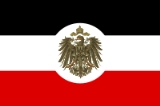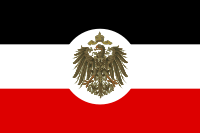
Reichskolonialamt
Encyclopedia

Development and reorganization
From its inception in 1884, a colonial service organization performed administrative functions (policy and management) for the executive arm of the imperial government. Until 1907 responsibility for this service was with the Colonial Department [Kolonialabteilung] as a subsection in the Foreign Office [Auswärtiges Amt]. From 1896 the department further co-supervised the colonial military or protection force, the "SchutztruppeSchutztruppe
Schutztruppe was the African colonial armed force of Imperial Germany from the late 19th century to 1918, when Germany lost its colonies. Similar to other colonial forces, the Schutztruppe consisted of volunteer European commissioned and non-commissioned officers, medical and veterinary officers. ...
", with its headquarters billeted in the naval ministry, the [Reichsmarineamt]. By the late 19th century the need evolved for a separate, higher ranking agency that would report directly to the Reich Chancellor. In early 1907 the Reichstag
Reichstag (German Empire)
The Reichstag was the parliament of the North German Confederation , and of the German Reich ....
removed the colonial department from the foreign office and elevated the department to an Amt [office], the Reichskolonialamt, to be managed by a cabinet level secretary. The new office was then physically relocated to Berlin’s Wilhelmstrasse. This legislation represented a complete reorganization and was a direct response to the nationwide so-called ‘Hottentot election’, after allegations of colonial malfeasance, corruption and brutality (e.g., German South West Africa) surfaced in the German print media. The shake-up subsequently involved extensive and wide-ranging personnel changes in civil service positions in the colonies. The Schutztruppe command structure was also reorganized and moved to Mauerstrasse, in close proximity of the Reichskolonialamt location.
The new secretary of the Reichskolonialamt reported directly to the head of government, the chancellor.
Reichskolonialamt secretaries
- Bernhard Dernburg (1865 – 1937), in office May 1907 – 9 June 1910
- Friedrich von Lindequist (1862 – 1945), in office 10 June 1910 – 3 November 1911
- Wilhelm SolfWilhelm SolfWilhelm Heinrich Solf was a German scholar, diplomat, jurist and statesman.-Early life:Wilhelm Solf was born into a wealthy and liberal family in Berlin. He attended secondary schools in Anklam in western Pomerania and in Mannheim...
(1862 – 1936), in office 20 December 1911 – 4 October 1918 - Johannes Bell (1868 – 1949), Colonial Political Envoy at the Paris Peace ConferenceParis Peace Conference, 1919The Paris Peace Conference was the meeting of the Allied victors following the end of World War I to set the peace terms for the defeated Central Powers following the armistices of 1918. It took place in Paris in 1919 and involved diplomats from more than 32 countries and nationalities...
from 13 February 1919 to 20 June 1919
Structure
The new Reichskolonialamt had three departments [Abteilungen]:- Department A dealt with general political, policy and administrative functions
- Department B managed fiscal, transport and technical tasks
- Department C was concerned with personnel matters
- The subordinated Kolonialhauptkasse [main cashiers bureau] dealt with disbursements, payrolls and other financial transactions
- The headquarters command of the Schutztruppe was often seen as the quasi fourth department, with colonial governors nominally the superiors of troop commanders in the field
The Kolonialrat [colonial advisory board] was replaced in 1908 (after the major reorganizations of 1907) by a panel of independent experts. A Landeskundliche Kommission [scientific and geographic commission] for exploration functioned for several years before its mission was modified and replaced in 1911 by the Ständige Wirtschaftliche Kommission [permanent economic commission]. Further commissions were formed by the German Agriculture Council and tasked with advising the colonial office.
The records of the Reichskolonialamt and other documents from the colonies are now preserved at the branch location at Berlin-Lichterfelde of the German Federal Archives and were previously held at the Deutsches Zentralarchiv, Potsdam, an agency of the former East German regime.
Reference
Zeller, Joachim & von der Heyden, Ulrich. Kolonialmetropole Berlin - eine Spurensuche [Colonial Metropolis Berlin - a Search for Traces]. Berlin. 2002.External links
- "Kolonialabteilung, Reichskolonialamt und Reichskolonialministerium 1890-1920" von Arne Schöfert
- Wilhelmstr. 62: Das Reichkolonialamt (Afrika in Berlin - Stadtspaziergang des DHMDeutsches Historisches MuseumThe German Historical Museum , DHM for short, is a museum in Berlin devoted to German history and defines itself as a place of enlightenment and understanding of the shared history of Germans and Europeans....
) - Reichskolonialamt im Koloniallexikon

